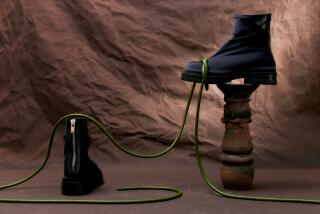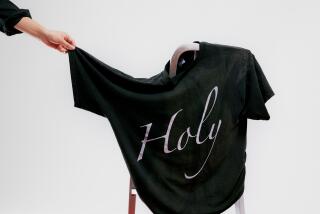Advertisers and Designer Words
- Share via
Adding his hope to mine that the advertising word affordable is passing out of vogue, Bill More of Vista names his own candidate for oblivion-- designer .
He means the use of designer as an adjective, perhaps the most common example being designer jeans .
“I loved those rugged, copper-riveted, practically indestructible blue denim pants created and sold by Levi Strauss,” More says. “He must be turning over in his grave at the mere thought of ‘designer jeans.’ To see what has happened to those historic pants of the Old West is enough to make a strong man weep.”
More notes that designer has infiltrated the home industry, so that we now have “designer kitchens,” “designer plumbing fixtures” and “designer-coordinated tile.”
“This buzzword is apparently intended to convey the feeling that something produced by a designer must possess superior beauty and utility and will enhance one’s life style. How ridiculous that seems when you consider that everything we own, our houses, autos, furniture, clothes, appliances, tools, electronics and even utensils were designed by someone--an architect, engineer, draftsman, artist or inventor. . . .”
More hasn’t touched on half the products that are now described as “designer.” The ultimate in spoofs of this ridiculous vogue was Joseph Wambaugh’s reference in one of his novels to “designer water,” obviously meaning a bottled drinking water with a pretentious advertising campaign.
Certainly the designer water that first comes to mind is Perrier, which has a snooty French name, an oddly shaped bottle, and a lush TV commercial that equates the presence of the Perrier springs in France with the breakup of the Ice Age, the alignment of Jupiter and Mars, the beauty of little uniformed French schoolgirls running in the leafy autumn woods, and other earthy phenomena. Now that’s a designer water.
My thoughts about the use of advertising’s most durable phrase-- new and improved --is echoed by Dan Baker, professor of radio, TV and film at Cal State Long Beach. Baker says “each new and improved product must replace an old and inadequate one. If the new is superior, the old must have been inferior. We have been using inferior products, then, that were at one time advertised as the best one could buy”
He points out that manufacturers at least are willing to admit that their previous products were not the best possible. Do we go on believing each year that at last we are being offered the ultimate product?
“There will be ‘new and improved’ ads till the end of time,” he fears. “Only discriminating consumers will know that they are passages, not destinations.
“I for one am tired of ad men replacing perfectly good products with new and improved substitutes simply because they are not beating out the competition on the shelf or in prime time. . . .”
There are always two points of view:
Despite Bill More’s distaste for designer , he not only applauds, he reveres the phrase new and improved because it paid his rent and kept food on his table, clothes on his back and gas in his car for 25 years.
More opened a “one-man-and-a-girl” advertising agency in the 1930s and one of his first accounts was an oil-burning heater that he hailed as “New! Improved! Now! At last! Finally!”
“I used new , now , at last , and of course improved for 25 years for a wide variety of consumer products and I’m glad to hear that it is still in vogue.”
Yet More professes to hate designer so much that he would like to see all ad people who use it “placed in the stocks for an hour, where we may pelt them with affordable fruits and vegetables, thereby playing havoc with their designer clothing.”
Surely there must be some new and improved punishment for such offenders.
Meanwhile, Duke Russell’s keen eye has noticed what we might call a designer word in bank names. Russell notes that a Times Business Section story on money market accounts refers to a Sincere Federal Savings Bank in San Francisco. What more could one ask of a bank than sincerity? Except perhaps fiduciary responsibility and a sound reserve. What, one wonders, does the Sincere Federal Savings Bank traffic in--affordable designer bonds?
Russell wonders whether other banks will soon turn up with such names as Candid, Earnest, Frank, Genuine, Guileless, Honest, Straight, True, Unaffected and Upright?
I like Ingenuous, myself.
Only one thing is certain. There will always be an ad man.
More to Read
The biggest entertainment stories
Get our big stories about Hollywood, film, television, music, arts, culture and more right in your inbox as soon as they publish.
You may occasionally receive promotional content from the Los Angeles Times.










